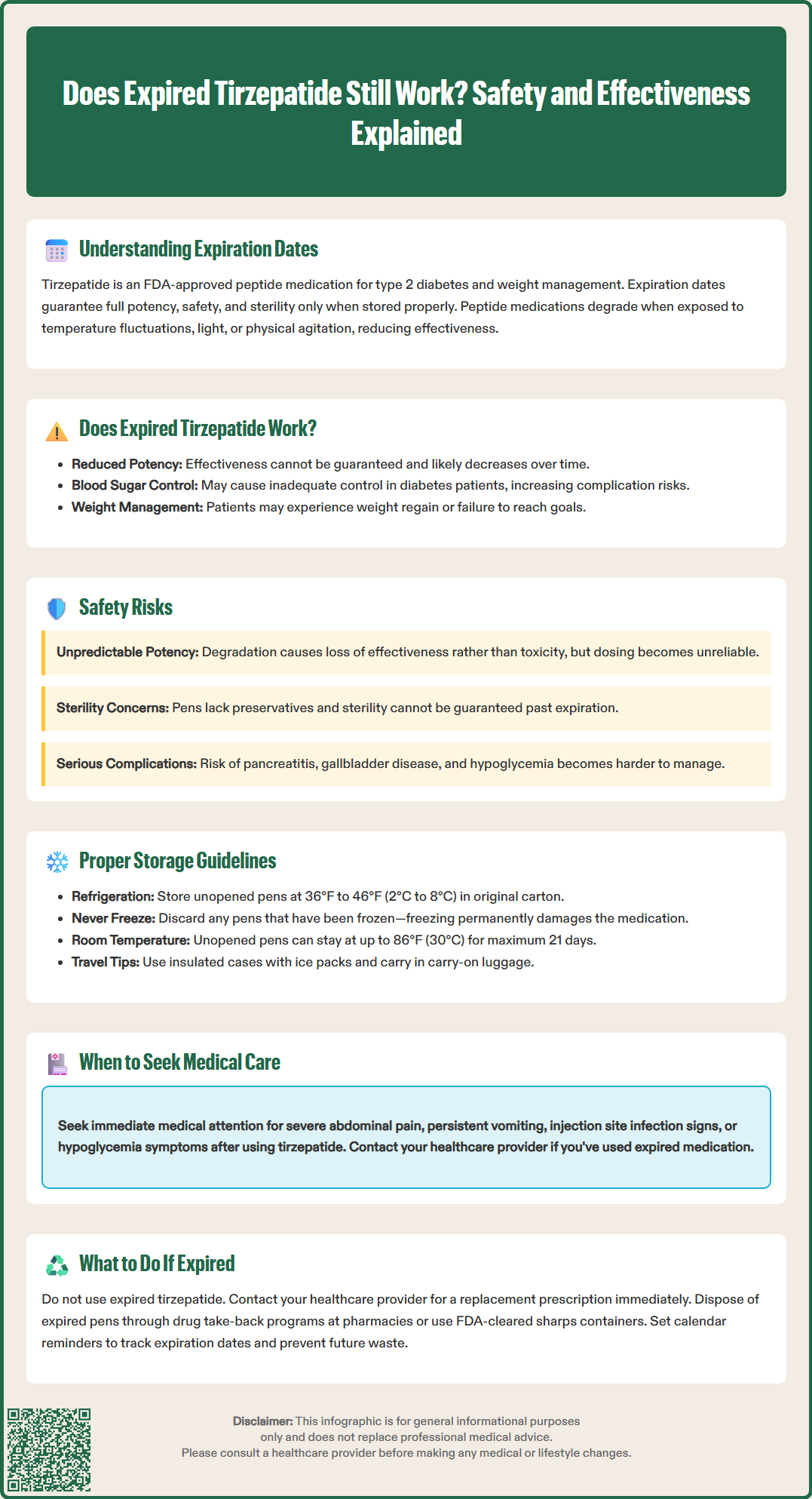LOSE WEIGHT WITH MEDICAL SUPPORT — BUILT FOR MEN
- Your personalised programme is built around medical care, not willpower.
- No generic diets. No guesswork.
- Just science-backed results and expert support.
Find out if you’re eligible

Tirzepatide is a dual glucose-dependent insulinotropic polypeptide (GIP) and glucagon-like peptide-1 (GLP-1) receptor agonist approved by the FDA for type 2 diabetes and chronic weight management. As a peptide-based medication supplied in single-dose prefilled pens, tirzepatide requires careful storage to maintain its therapeutic effectiveness. Many patients wonder whether expired tirzepatide retains its potency and whether it's safe to use beyond the printed expiration date. Understanding medication stability, safety risks, and proper handling is essential for optimal treatment outcomes and patient safety.
Quick Answer: Expired tirzepatide cannot be guaranteed to work effectively, as peptide degradation reduces potency over time, potentially leading to inadequate glycemic control or treatment failure.
We offer compounded medications and Zepbound®. Compounded medications are prepared by licensed pharmacies and are not FDA-approved. References to Wegovy®, Ozempic®, Rybelsus®, Mounjaro®, or Saxenda®, or other GLP-1 brands, are informational only. Compounded and FDA-approved medications are not interchangeable.
Tirzepatide is a glucose-dependent insulinotropic polypeptide (GIP) and glucagon-like peptide-1 (GLP-1) receptor agonist approved by the FDA for type 2 diabetes management and chronic weight management. As a peptide-based medication, tirzepatide requires careful handling and storage to maintain its structural integrity and therapeutic efficacy.
Expiration dates on tirzepatide products represent the manufacturer's guarantee that the medication will retain its full potency, safety, and sterility when stored according to labeled conditions. These dates are established through rigorous stability testing conducted under FDA guidelines, which evaluate the chemical composition, potency, and purity of the medication over time. The expiration date applies to unopened single-dose prefilled pens stored under recommended conditions.
For tirzepatide, stability is particularly critical because peptide medications are susceptible to degradation through several mechanisms. Temperature fluctuations, light exposure, and physical agitation can cause the peptide chains to break down or aggregate, potentially reducing the medication's effectiveness. The expiration date provides a conservative estimate of how long the manufacturer can guarantee the medication maintains its labeled potency.
It is important to understand that tirzepatide is supplied in the US as single-dose prefilled pens that are used once and then discarded immediately after injection. According to FDA labeling, unopened tirzepatide pens may be stored at room temperature up to 86°F (30°C) for up to 21 days if needed. This 21-day period applies to storage before use, not after the pen has been used.

The effectiveness of expired tirzepatide cannot be guaranteed and likely diminishes over time, though the rate of degradation depends on storage conditions. While some medications may retain partial potency beyond their expiration dates, there is no reliable way for patients or clinicians to determine how much active ingredient remains in expired tirzepatide without laboratory analysis.
Peptide medications like tirzepatide are generally less stable than small-molecule drugs. The complex three-dimensional structure required for receptor binding can be disrupted by environmental factors, leading to reduced biological activity. Data on post-expiration potency of GLP-1 receptor agonists are limited, but degradation is expected to occur over time, particularly when storage conditions are suboptimal. Using expired tirzepatide may result in inadequate glycemic control or insufficient weight management effects, potentially leading to disease progression or treatment failure.
The clinical consequences of using expired tirzepatide extend beyond reduced efficacy. Patients with type 2 diabetes who rely on tirzepatide for glucose management may experience elevated hemoglobin A1c levels if the medication has lost potency. This can increase the risk of diabetes-related complications including cardiovascular disease, nephropathy, and retinopathy. For patients using tirzepatide for weight management, reduced potency may result in weight regain or failure to achieve therapeutic goals.
There is no official guidance from the FDA or professional medical organizations supporting the use of expired tirzepatide. The FDA advises against using expired medications. Healthcare providers should counsel patients that expired tirzepatide should not be considered therapeutically equivalent to unexpired medication.
Using expired tirzepatide poses several safety concerns beyond reduced therapeutic efficacy. The primary risk involves unpredictable medication potency, which can lead to subtherapeutic dosing. While tirzepatide degradation typically results in loss of activity rather than formation of toxic compounds, the safety profile of degraded peptide products has not been systematically studied in humans.
Tirzepatide is supplied as sterile, single-dose prefilled pens intended for one-time use and immediate disposal after injection. These pens do not contain antimicrobial preservatives. While the risk of contamination in an unopened, sealed pen is low even after expiration, the sterility and integrity of the delivery system cannot be guaranteed beyond the expiration date.
Common adverse effects of tirzepatide include gastrointestinal symptoms such as nausea, vomiting, diarrhea, and decreased appetite. These effects are dose-dependent and typically diminish over time with continued use. If expired tirzepatide has unpredictable potency, patients may experience inconsistent therapeutic effects. More serious adverse effects include pancreatitis, gallbladder disease, and hypoglycemia when used with insulin or sulfonylureas. Using expired medication complicates clinical decision-making if adverse events occur.
Patients should seek immediate medical attention if they experience severe abdominal pain, persistent vomiting, signs of infection at injection sites (redness, warmth, swelling, or discharge), or symptoms of hypoglycemia (confusion, sweating, rapid heartbeat, or loss of consciousness) after using any tirzepatide product. Healthcare providers should document any use of expired medications and monitor patients more closely for both efficacy and safety concerns.
Proper storage of tirzepatide is essential to maintain its stability and effectiveness throughout its labeled shelf life. According to FDA-approved labeling, unopened tirzepatide pens should be refrigerated at 36°F to 46°F (2°C to 8°C) and protected from light in their original carton. The medication should never be frozen; if tirzepatide has been frozen, it must be discarded even if it subsequently thaws. Freezing can cause irreversible damage to the peptide structure and compromise the delivery mechanism in prefilled pens.
If needed, an unopened tirzepatide pen may be stored at room temperature up to 86°F (30°C) for up to 21 days before use. If storing at room temperature, consider tracking the date the pen was removed from refrigeration. The pen should be kept with the cap on when not in use to protect it from light. Patients should avoid storing tirzepatide in areas with temperature extremes, such as car glove compartments, near windows with direct sunlight, or in bathrooms where humidity and temperature fluctuate significantly.
Key storage recommendations include:
Keep refrigerated until ready to use – Store unopened pens in the original carton in the refrigerator
Never freeze – Discard any tirzepatide that has been frozen
Protect from light – Keep the pen in its original carton
Monitor temperature – Avoid exposure to temperatures above 86°F (30°C)
Track room temperature storage – If storing unrefrigerated, use within 21 days
Inspect before use – Check for discoloration, particles, or cloudiness
Patients traveling with tirzepatide should use insulated medication travel cases with ice packs (ensuring the medication does not come into direct contact with ice). For air travel, tirzepatide should be carried in carry-on luggage rather than checked baggage, as cargo holds may experience freezing temperatures. Airlines generally permit passengers to carry injectable medications and cooling supplies through security checkpoints with proper documentation.
If you discover that your tirzepatide has expired, do not use it. Contact your healthcare provider or pharmacist immediately to obtain a new prescription. Check with your pharmacist or insurance provider about replacement options, as policies regarding early refills for expired medications vary. Your pharmacist can coordinate with your insurance company and prescriber to explore available options.
Dispose of expired tirzepatide properly to prevent accidental use and environmental contamination. The FDA recommends using drug take-back programs as the preferred disposal method. Many pharmacies, hospitals, and law enforcement agencies offer medication take-back services or maintain permanent collection sites. The DEA sponsors National Prescription Drug Take-Back Days twice yearly, providing convenient disposal opportunities nationwide.
Tirzepatide pens contain needles and are considered sharps that require special disposal. If take-back programs are unavailable, follow FDA guidance for sharps disposal:
Use an FDA-cleared sharps disposal container if possible
If unavailable, use a heavy-duty plastic household container with a tight-fitting, puncture-resistant lid
Label the container "SHARPS - DO NOT RECYCLE"
When nearly full, follow local community guidelines for proper disposal
Never place loose sharps in household or public trash cans
Do not flush tirzepatide pens down the toilet
To prevent future medication expiration, implement a system to track expiration dates when you receive new prescriptions. Set calendar reminders for the printed expiration date. Communicate with your healthcare team if you are having difficulty affording or accessing tirzepatide, as patient assistance programs may be available. If you frequently have expired medications, discuss with your provider whether your current prescription quantity or dosing schedule needs adjustment. Never share prescription medications with others, as this is both illegal and potentially dangerous.
Tirzepatide's effectiveness cannot be guaranteed after expiration, as peptide degradation occurs over time. The FDA advises against using expired medications, as there is no reliable way to determine remaining potency without laboratory testing.
Using expired tirzepatide poses risks including unpredictable potency leading to inadequate blood sugar control, potential treatment failure, and increased risk of diabetes complications. While degradation typically results in loss of activity rather than toxicity, sterility and medication integrity cannot be guaranteed beyond expiration.
Store unopened tirzepatide pens refrigerated at 36°F to 46°F in the original carton, protected from light. Never freeze the medication. If needed, unopened pens may be kept at room temperature up to 86°F for maximum 21 days before use.
All medical content on this blog is created using reputable, evidence-based sources and is regularly reviewed for accuracy and relevance. While we strive to keep our content current with the latest research and clinical guidelines, it is intended for general informational purposes only.
This content is not a substitute for professional medical advice, diagnosis, or treatment. Always consult a licensed healthcare provider with any medical questions or concerns. Use of this information is at your own risk, and we are not liable for any outcomes resulting from its use.